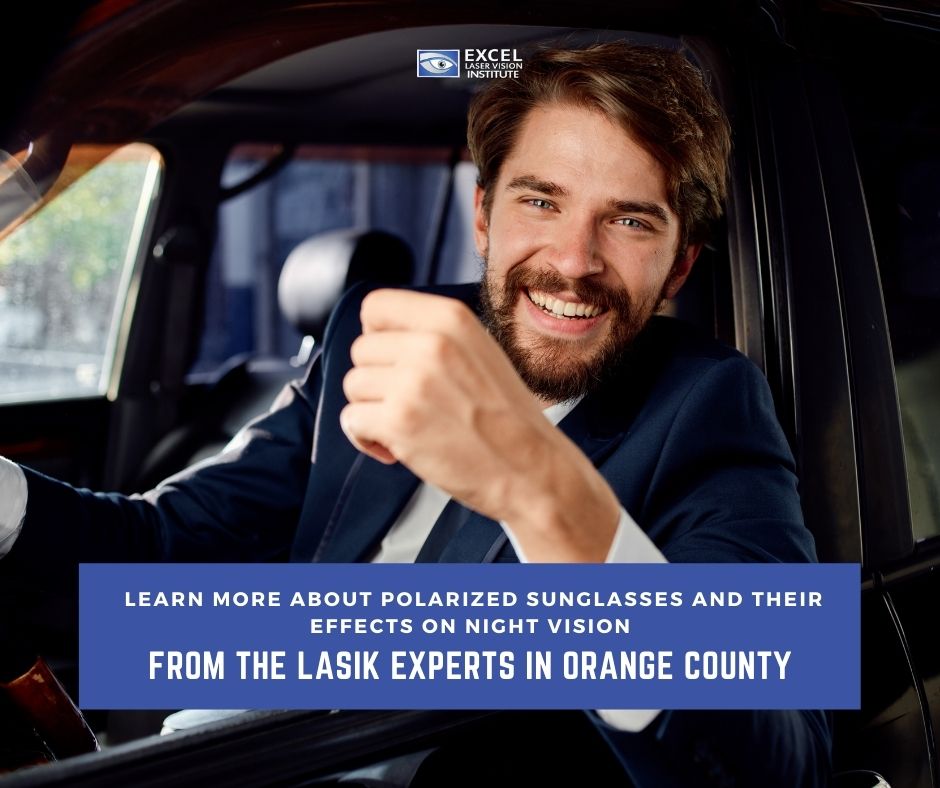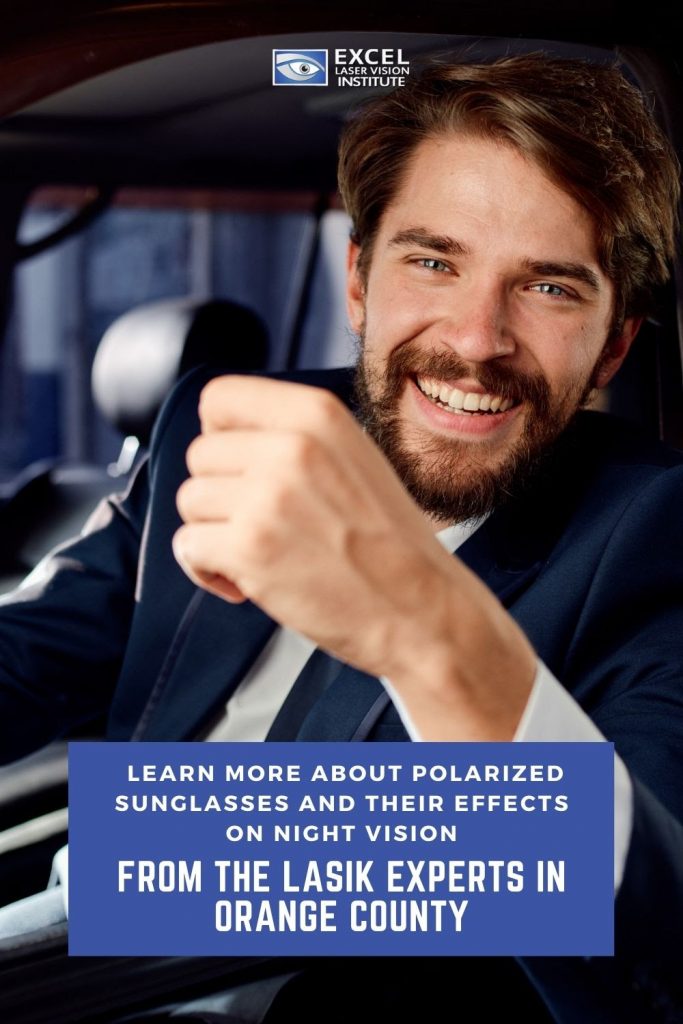
You may have heard of polarized sunglasses from some of your friends or family. If you have trouble seeing where you are going as you drive about at night, you are probably looking for options to improve your sight while you cruise down dark roads.
Indeed, Doctor Moosa, a well-known LASIK surgeon in Orange County, believes that polarized sunglasses are a good way of reducing glare in bright situations such as boating, outdoor sports, or even driving on a sunny day. However, what about instances when you want to lessen the distracting reflection of headlights and street lights at night?

What Are Polarized Lenses?
Doctor Ferzaad Moosa, a LASIK expert in Orange County, gently explains that a “polarized lens” has a laminated filter applied to the lens to prevent a portion of light from passing through the eye. The whole point of wearing polarized sunglasses is to use them for settings where the light is more intense when reflected off flat surfaces, which increases the amount of light and makes it challenging to see clearly.
LASIK eye doctors tell us that light is important for the eye to see, but when more light enters your eye, it knows what to do with it; it causes glare. In layman’s terms, glare occurs when your eyes are exposed to a lot of bright light.
Also, you have to consider that only allowing a limited amount of light into the eye allows polarized lenses to reduce glare, leading to improving vision.
The LASIK experts, particularly Doctor Moosa of excel laser Vision Institute in Orange County, say that the truth about polarized lenses is that they can help to reduce the glare of oncoming traffic lights when driving after dark. Nevertheless, wearing sunglasses of any type in low-light conditions, particularly while driving, is dangerous and absolutely not advised.
Can Polarized Lenses Help With Night Driving?
Even though polarized lenses could lessen glare from oncoming traffic, they don’t automatically assist with night driving and could, perhaps, do more harm than good.
The filter on polarized lenses blocks some light from hitting the eye, so it creates a dimmer view when you wear them. Preventing extra light from an already low-light condition can limit your vision even further compared to the glare of traffic lights.
If you notice that driving at night is becoming a burden, there are other options to wearing polarized sunglasses to get clear vision when driving, especially at night.
What Are Night Vision Glasses?
Night-driving glasses are the go-to choice for people who want additional contrast and clarity on the road, but the effectiveness of this eyewear isn’t as good as expected.
In 2019, the Schepens Eye Research Institute conducted a study to determine how useful night driving glasses really are.
The researchers brought together 22 adults who portrayed a huge population and had them drive in four nighttime driving simulations.
The simulations put the drivers in many different experiences, including a machine that copied the effect of oncoming traffic lights while wearing either clear lenses or yellow-tinted night driving glasses.
The participants in this research study had their reaction times recorded in each scenario every time they saw a pedestrian on the roadway side.
The study’s conclusive results were that wearing night driving glasses made no improvement in driver performance in the most critical task, and that is detecting pedestrians.
Besides that, researchers claim that a slight amount of statistical data revealed a marginal decline in performance when wearing night vision glasses compared to driving without them.
Generally speaking, the results of the study above do not back up the concept that eye care professionals should prescribe night-driving glasses to patients.
What Are The Best Night Vision Glasses For Driving?
If you experience some challenges when driving at night which are affecting how frequent or when you drive, you should take some time to get an eye exam and talk about your issues with an eye doctor. They can prescribe lenses with anti-reflective coating to reduce the glare you experience when driving.
If it turns out that you don’t need a prescription, your eye doctor can recommend non-prescription lenses that can be bought with the same coating to reduce the irritating reflections of headlights and streetlights.
Why Night Vision Glasses May Be A Bad Idea
Normally, glasses with yellow-tinted lenses can improve contrast in specific daylight conditions because the yellow tint prevents some of the sun’s blue light from entering the eye.
This high-energy visible (HEV) blue light is probably the cause of glare when it comes into contact with the eye, compared to other forms of visible light.
Yellow tinted lenses give off a blue-blocking filtration which usually happens with amber and copper-colored lenses.
These darker tinted lenses can prevent a lot more blue light from entering than yellow lenses. However, they also block more light from entering the eye, which lowers visibility even more in low-light conditions.
As a matter of fact, yellow lenses lower the overall visible light to a certain level because they also block some blue light. Perhaps this is beneficial during the day, but not at night when you have to see as much as possible.
It is a shame that some people feel that they have to give up driving at night or low-light glare.
However, if you are really serious about improving your eye vision, then speak to an eye care professional at Excel Laser Vision Institute, a reputable LASIK clinic in Orange County. Laser eye surgery can treat many refractive errors and ensure that your vision is in tip-top shape before you drive on busy and dangerous roads at night. LASIK professionals will conduct a thorough evaluation of your eye health and condition before determining if you are eligible for LASIK eye surgery or a comparable procedure.
Call Excel Laser Vision Institute at (888) 957-3255. Our team of staff is highly trained and knowledgeable. In the office, we also have Dr. Moosa, a well-esteemed LASIK surgeon in Orange County with a Harvard education and a wealth of experience working with different prescription levels. Dr. Moosa has helped many professionals achieve their vision goals, from athletes to models to military personnel. Visit our website to learn more: https://www.exceleye.com/




